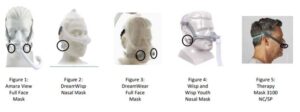The Food and Drug Administration (FDA) recently sent a safety communication regarding the Class I recall of certain Philips Respironics CPAP and BiPAP masks due to magnets in headgear clips that could interfere with some implanted metallic medical devices and metallic objects in the body. (Originally, this recall was voluntary, but was changed to Class I on Oct. 19, 2022. Class I recalls are the most severe type of FDA recall, meaning that there is a potential for serious injury or death.)
The potential adverse events (injury or death) can occur in people who use the masks or in people who are near to a person using the mask.
If they come within 6 inches of the body, the magnets could affect pacemakers, implantable cardioverter defibrillators, metallic stents, neurostimulators, magnetic metallic implants, electrodes, and valves near the head, cerebral spinal fluid shunts, aneurysm clips, embolic coils, intracranial aneurysm intravascular flow disruption devices, metallic cranial plates, screws, burr hole covers, and bone substitute devices, ocular implants, certain contact lenses with metal, implants to restore hearing or balance that have an implanted magnet (including cochlear implants, implanted bone conduction hearing devices, and auditory brainstem implants), magnetic denture attachments, implantable ports and pumps, metallic gastrointestinal clips, certain metallic joint replacements, devices labeled as magnetic resonance (MR) unsafe, magnetic metallic implants not labeled for MR or not evaluated for safety in a magnetic field, and metallic splinters in the eye or metallic shrapnel in the body.
Any questions on mask substitutes can be directed to Philips customer service at 800-345-6443 or www.usa.philips.com; reports of injuries to patients can be sent via the FDA’s MedWatch Voluntary Reporting Form at https://www.accessdata.fda.gov/scripts/medwatch/index.cfm?action=reporting.home).
